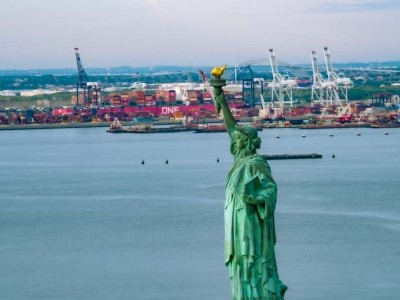Dubai World pays $8.2 billion early to complete debt revamp
Dubai World completed a decade-long debt restructuring ahead of schedule as the emirate prepares to tackle the economic fallout of the coronavirus pandemic.
The government-owned conglomerate repaid $8.2 billion—due in September 2022—using funds from asset sales, dividend payments and the delisting of port operator DP World Ltd., taking its total repayments to $18.9 billion since 2011, it said on Tuesday.
“We’re really trying to get the job done,” Mohammed Al Shaibani, a Dubai World board member and one of the emirate’s top officials, said in an interview. “As soon as we’re able to pay, we just do a payment. This is not the first time we pay ahead of time by the way.”
The payment comes as Dubai faces the prospect of restructuring a chunk of government-related debt maturing at the end of 2021 for a second time, according to Fitch Ratings Inc. The Middle East’s business and travel hub, which is emerging from weeks of lockdown, is especially vulnerable given its reliance on tourism and trade. A prolonged property slump and a retail sector that’s struggling are also weighing on the city.
The current downturn follows the 2009 financial crisis that forced Dubai World to restructure $23.5 billion of debt and saddled property developer Nakheel PJSC with $10.5 billion of unpaid bills. Some of the debt owed by Dubai government-related companies faces “more corporate distress” if there’s a prolonged economic slump, according to Bank of America Corp., which estimates that Dubai Inc. has about $6.8 billion of loans and $3.1 billion in bonds coming due in 2021 and 2022, excluding the government and banks.
Funds
Dubai World used funds from its subsidiaries to repay the debt, including $6 billion from Port and Free Zone World, $2.7 billion from the sale of Economic Zones World and a $1.6 billion dividend from Infinity World. It also raised a $3 billion loan from Dubai Islamic Bank PJSC.

Dubai still has access to liquidity and doesn’t need support from its oil-rich neighbor Abu Dhabi that helped during the last crisis, said Shaibani, also director general of the ruler’s court and head of Investment Corp. of Dubai—the emirate’s main investment arm.
The emirate would consider raising new funds through private placements, an international bond or by tapping local banks, he said. “Everything is on the table.”
The Dubai World payment will “boost confidence and is at least partly aimed at demonstrating that existing debts will not drag the Dubai economy down,” said Scott Livermore, chief economist in the Middle East at Oxford Economics. “This is potentially a signal that will help other sectors of the economy to raise funds to manage through crisis and support the recovery.”
Dubai will financially support its flagship carrier, Emirates, which is responsible for feeding the city’s hotels and trade shows with business travelers and tourists, Shaibani said. The airline has cut jobs and reduced salaries after the pandemic halted global air travel but has begun re-operating various international routes.
“Emirates is extremely strategic for us and we’re always going to be there to support it,” he said. “As a government, Dubai definitely we will be there to support.”
Shaibani also said:
- On Abu Dhabi: “We always strategize of course We are neighbors, we look at each other’s interests”
- Dubai has no immediate plans to sell assets, but “definitely, we’re talking to a few of our partners to see exactly what is the next step for some of these investments”
- “As Investment Corp. of Dubai we support all our subsidiaries. There are a lot of nice stories. Hopefully in the next few months things ease up a little bit with this corona. Things will bounce back very quickly. We are quite ready”
Similar Stories

Annual figures for Port of Antwerp-Bruges show growth despite challenging times
View Article
Port of Savannah’s Ocean Terminal, receives four new electric Ship-to-Shore cranes
View Article
Port of Seattle Statement on importance of industrial lands
View Article
Port of Los Angeles processed 10.3 million TEUs in 2024
View Article
Port Authority to outilne upcoming PATH Hoboken Station closure, detail alternate travel options
View Article
Georgia Ports welcomes Wallenius Wilhelmsen’s new Brunswick hub facility
View ArticleGet the most up-to-date trending news!
SubscribeIndustry updates and weekly newsletter direct to your inbox!





